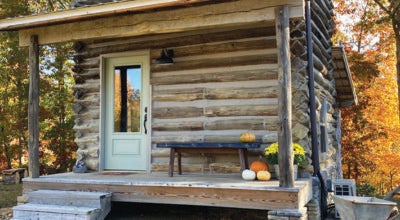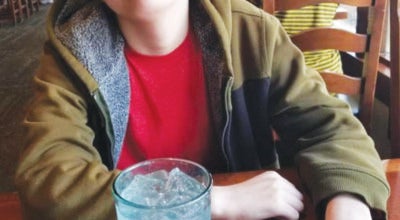The Literary Corner: Renegade Writer’s Guild
Published 2:17 pm Tuesday, June 8, 2021
|
Getting your Trinity Audio player ready...
|
The Scourge of Summer
By N.R. Tucker
As someone who hikes early in the day in spring and summer to escape, or reduce, the heat, I have the same experience every year — spider webs on the trail. The non-hiker, or the person walking a wide paved path, will not understand this complaint.
Spiders build webs over trails between trees and shrubs to capture unsuspecting prey. A single- file trail provides the spider with a perfect place to spread out its web and snag a meal. The result: the first hiker on a trail gets webbed. It’s not a one-and-done thing. After that first spider web, many hikers pull their hiking sticks out and wave them out in front as they move down the trail. Some wave the stick up and down; others wave left to right. A few, wishing for times gone by, wield their sticks like a sword. I am a figure-eight waver.
I hold my hiking stick in front of me and make a figure-eight motion to encompass both the left to right and top to bottom movements. This form provides the best of both worlds, but eventually, the arm tires and the stick switches hands. When the other arm tires, I reattach the stick to my pack and continue down the trail. Within a few steps, I walk into another spider web — every time. Apparently, I can’t be taught.
Why do I do this? Is it my belief that spiders only build webs at the beginning of trails? No. Could it be that I think another hiker cut through the woods and accessed the path in front of me, and now they are acquiring the spider webs in the face? No. Perhaps I’m hoping karma has kicked in, and I’ve had my fair share of webs for the day. Again, no. Am I really that optimistic? Absolutely not.
The simple fact is my arms tire. Not awe-inspiring, but it is the truth. The only way to not face morning spider webs is to not be the first person on the trail.
The entire experience boils down to one question: Do I want the somewhat cool morning air and spiderwebs or the oppressive heat and clear trails later in the day. I’ll take the spider webs every time.
Dear Dr. Jenkins
By Linda H. Barnette
Dear Dr. Jenkins,
I’m sorry that you are no longer around to read this, but I’ll just pretend you are!!
Before going to Catawba College in the fall of 1959, I had been told about you by my uncle, Charles Wrenn, who was an English major and was in several of your classes in the early 1950s. His comments helped me to like you before I met you.
It was in English 101 that I must have made a good impression on you. We had read something that had the word “victuals” in it. You asked the class how that word was pronounced, and I had seen enough cowboy movies to know that they often referred to food as “vittles.” So I shyly raised my hand for the first time in your class and said that. I was thrilled to have gotten it correct and remember your sparkling eyes and your dimpled smile when my answer was right.
At some point after that, you asked me if I would be interested in being your assistant. Of course, I agreed and remember grading what seemed like hundreds of freshmen essays over the next few years. Another duty was to write assignments on the board for the students when you sometimes went to a conference or to your Rose Society meetings. I was awed that you would ask me to do such important things.
I also remember that you were not only a scholar (Rhodes) but also a gentleman of the old school. You treated me like a friend but kept your distance. When you brought me camellias from your greenhouse, I was thrilled, as I was also a lover of beautiful flowers. When I had to deliver papers to your house across from the dorm, your lovely wife, Olive, always welcomed me warmly. Another memory is that you allowed me to take my Senior English exam in your home as I had a bad sunburn and missed the day of the test. Mrs. Jenkins even offered me a drink of water.
Naturally, it was to you that I sought advice about graduate school in the spring of 1960. You suggested the University of Tennessee as you knew the chair of the department there. As it turned out, I got a graduate assistantship and went there for my master’s in English and would have stayed for my doctorate had I not chosen marriage.
Your classes were the best part of my weeks at Catawba, and I especially loved your “jewel matches,” for which we had to memorize famous quotes from our readings. You were the one who also inspired me to love Shakespeare and to major in English. When I finally got to visit Stratford-upon Avon, my thoughts turned to your great influence on the course of my life. I am ending this letter with the quote from Shakespeare’s Sonnet 104 that I have loved since you read it to us in Hedrick Hall so very long ago.
To me, fair friend, you never can be old.
For as you were when first your eye I eyed
Such seems your beauty still.
Addendum: I wrote this as part of our library’s virtual group when assigned to write a letter to a favorite teacher or professor.
First Light
By Stephanie Williams Dean
Recently I traveled to Lubec, Maine for the sole purpose of witnessing “first light” on the United States. From a room with wide expansive views, I viewed dawn’s first rays hitting both land and sea. The experience was an awesome one.
Lately, I’ve been reading more on first light and the Holy Spirit. In a series of writings, I’ll be clarifying some concepts regarding the Spirit. According to Genesis 1:3, God, said, “let there be light,” and there was light. Because God created the sun, moon and stars, which illuminated the earth on the fourth day, I looked to the Bible for answers to the light created on the first day.
In John 8:12, Jesus said to the people, “I am the light of the world. Whoever follows me will never walk in darkness but will have the light of life.” (NIV) This is the light of life but not the light of illumination. Jesus is telling us that he will give this light to whoever follows him.
To clarify, we know the first light was the Spirit of God, which was transferred to Jesus Christ. Christ, and then became the custodian of the Sprit, which is the Holy Spirit and the light. The Bible tells us the light in Him is life – and that life is the light of man. Jesus is telling us that he will give this light to whoever follows him. Again, this is the light of life and not illumination.
John was sent from God to testify to that which concerned the light so that all men might believe. John 1:9 reads, “the true light that gives light to every man was coming into the world.” (NIV)
Today, this light still shines in the darkness but the darkness does not understand it. There are many who have not accepted Jesus Christ as their personal Savior. But we can be assured that if we repent of sin and come to Him, He will light every person – with a living soul.





